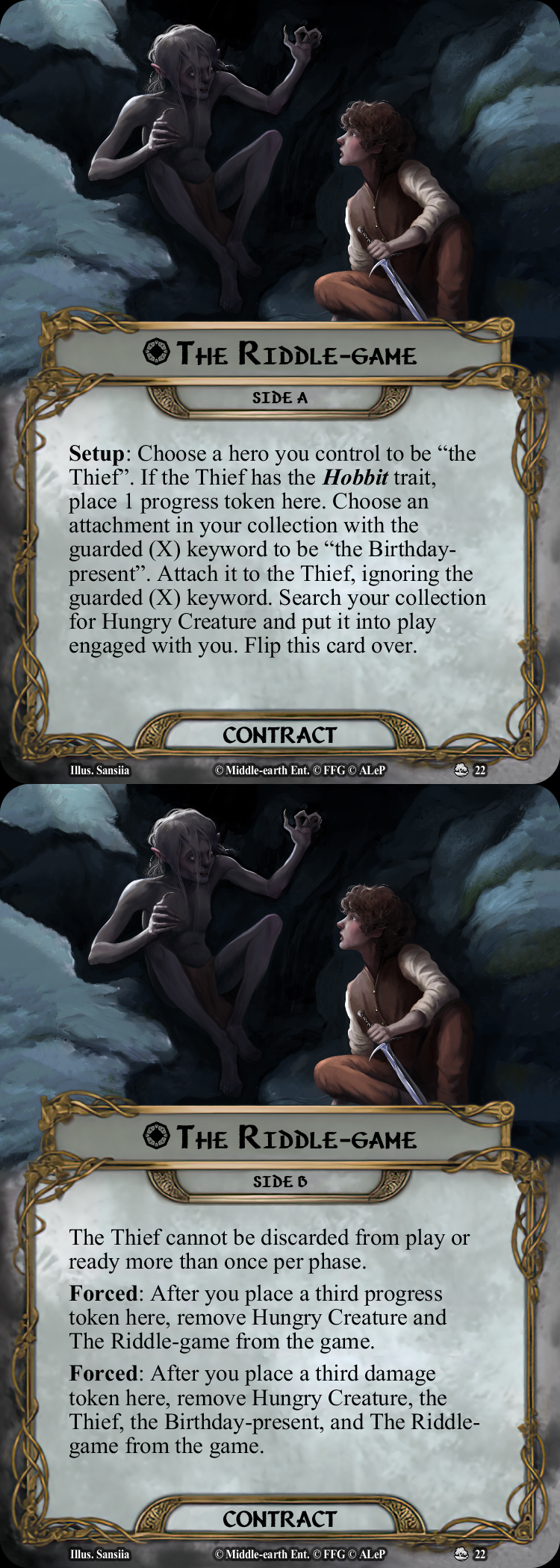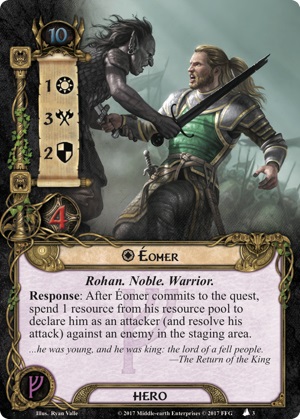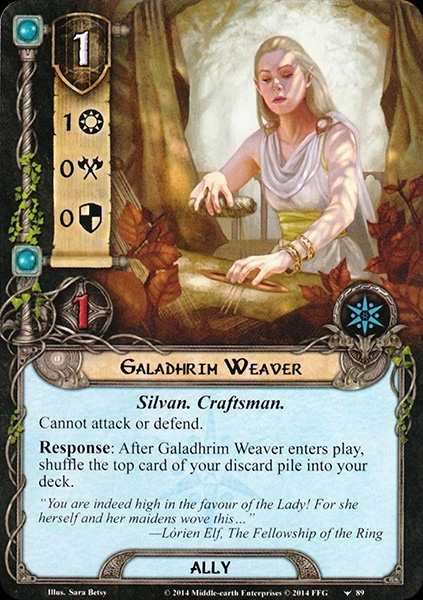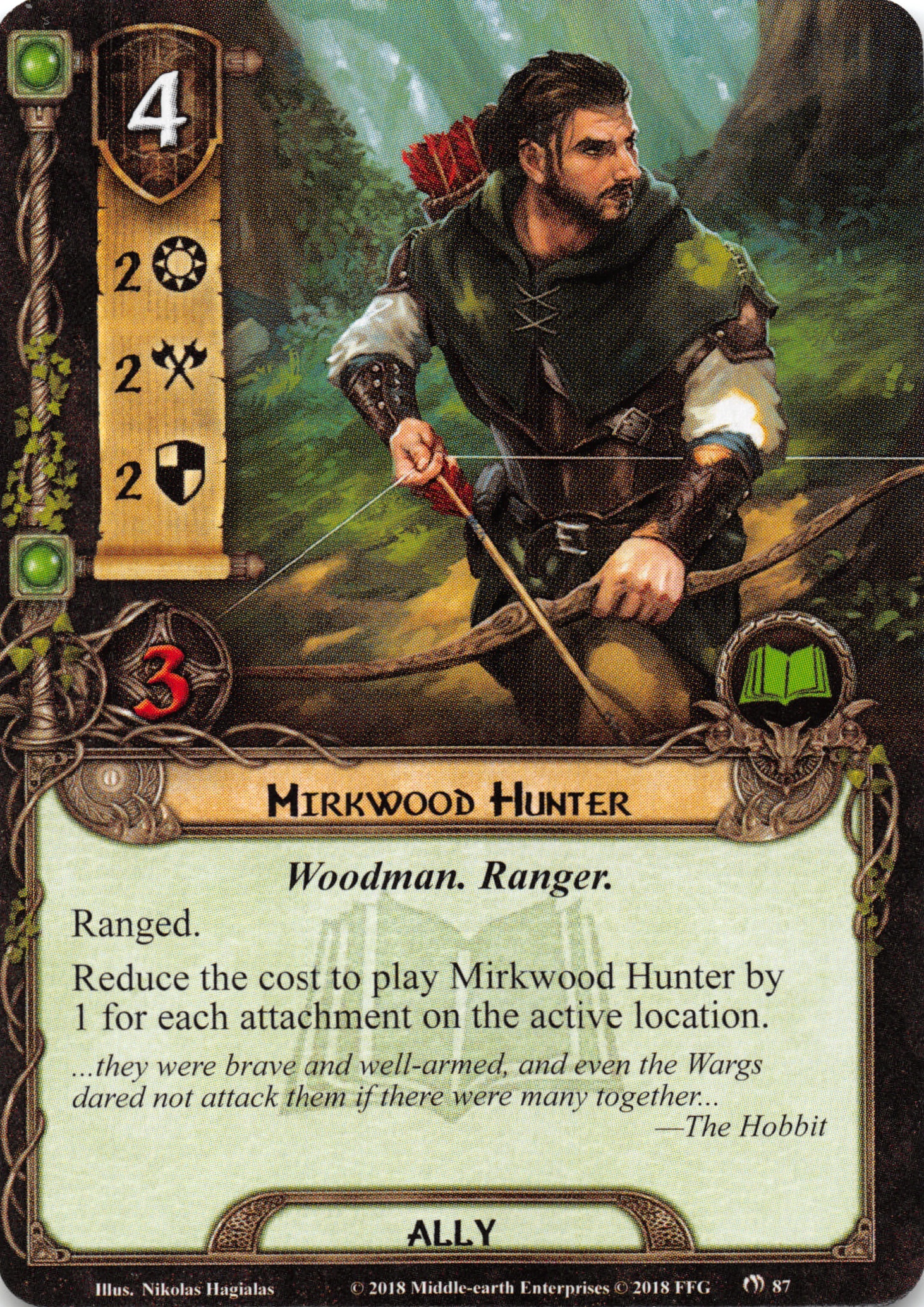The Riddle-game presents an intriguing gamble. You get to start the game with a powerful Guarded attachment for free. However, you also start engaged with Hungry Creature. While it cannot attack or interact with any other cards on the table, you do have to riddle with it -- and if you lose three times, bye bye to your hero and the attachment. However, if you win three times -- which is doable with planning -- the Hungry Creature goes away. So, how bad is the Hungry Creature? And how good are the potential Guarded attachments you can start with?
First, Hungry Creature. Here's its text, since it's not on RingsDB:
Forced: When Hungry Creature is dealt a shadow card, look at it and note its . The engaged player may discard a card from their hand with a matching printed cost to place 1 progress token on The Riddle-game. Otherwise, place 1 damage token on The Riddle-game.
The riddle-game is played by discarding cards. So even if you win, you'll have to discard at least three cards (two with a Hobbit), and possibly up to 5. If you lose, of course, then you've lost the hero and likely will lose the scenario barring an explosive start. But you can plan to win. Starting with a Hobbit is handy, though limiting. Other than that, your best bet is to stack a bunch of zero-cost cards, since every Treachery in the encounter deck has 0 threat – so you’ll be able to win more often than not simply by having a 0-cost card in your hand. Have a good selection of 1, 2, and 3-cost cards around as backup and you’ll usually be able to win. There are many good 0-cost options in every sphere that are very splashable and will not go to waste. In Leadership you’ve got, for example, commonly played cards such as We Are Not Idle, Captain's Wisdom, Dúnedain Remedy, A Very Good Tale, Legacy of Númenor, and Cram. Lore has staples like Daeron's Runes, Ioreth, Deep Knowledge, and Woodmen's Clearing. Spirit is more lacking, but still has Elrond's Counsell and Double Back, plus some more conditional 0-cost cards like Galion or Spare Hood and Cloak. Tactics has great options like Round Shield, Foe-hammer, and Dúnedain Hunter, plus some more conditional options. And even Neutral brings some useful 0-costs, like A Good Harvest, Good Meal, The Shirefolk, The Seeing-stone, and Well-Equipped. You can also run Shadow of the Past in any deck to let you stack an encounter card with the right for what you’ve got in your hand.
Assuming you’ve planned ahead, you know you have a good chance of winning the riddle-game. However, it will slow you down in the process as you’ll have to discard a card every round until you win. This drawback does affect the calculus of which Guarded attachments are the best to use – those that give you extra card draw obviously offset the cost the most, while giving you a better chance to have the right answer to the Hungry Creature’s riddle in hand. But let’s take each of the possible Guarded attachments in turn and consider their merits.
Stone of Elostirion: Top contender for best all-around starting attachment. Can go on any hero you want, and +2 willpower and +1 card draw are always welcome to get you out of the gate quickly, and importantly will always be useful first turn.
The Arkenstone: Another top contender. Can also go on any hero, and it starts you off at +3 willpower first turn. It works well with Ioreth and Galion plus other cheap uniques like Wilyador and Henamarth Riversong. With a well-constructed deck, this attachment can help you easily get on top of any scenario where strong early questing is needed. Plus, it grows with time so will still be relevant mid and late game.
Necklace of Girion: Like the Stone, can go on any hero and gets you a +2 willpower boost from turn 1. I rate an extra resource lower than an extra card, but for a Lore-heavy deck this could be the better option over the Stone.
Ring of Thrór: Tied with the Necklace for third place. While it’s limited to a Dwarf hero, the first turn readying combined with the ability to spam a high-cost attachment into play every turn can easily offset the risk and lost cards from Hungry Creature. Best targets are probably Gimli, with his well-rounded stats and 2 willpower, or Thorin for his 3 willpower and 3 attack. Plus dwarves have very handy 0-cost cards like Khazad Khazad, Well-equipped, and Unlikely Friendship (if you’re running an elf hero as well).
Elendilmir: This is the wild card for me. It’s obviously limited in terms of who it could work with. I wouldn’t use it if you’re planning to play it on Aragorn, but if you want to put it on Galadriel or Beravor, then I could see it being very powerful so long as you’ve got early readying potential.
Four of the Guarded attachments are Weapons: Glamdring, Orcrist, Sting, and Durin's Axe. All these are really only useful for attacking (and defending with Sting). So you’re not guaranteed to get use out of them first turn, except in certain scenarios where an enemy starts in play. I don’t see as much justification to use any of these with The Riddle-Game, with the possible exception of Glamdring with a hero like Éomer or Haldir of Lórien who want to be knocking out enemies in staging as soon as possible. The extra card(s) from Glamdring can, in the right scenario, offset the cost of the Riddle-Game. All other weapons are likely not worth it.
Last is the Mithril Shirt. I suppose there are some very specific scenarios where having the Shirt from turn 1 could save the day – maybe in a Bree deck against the right encounter deck – but 99% of the time this would be an utter waste.



